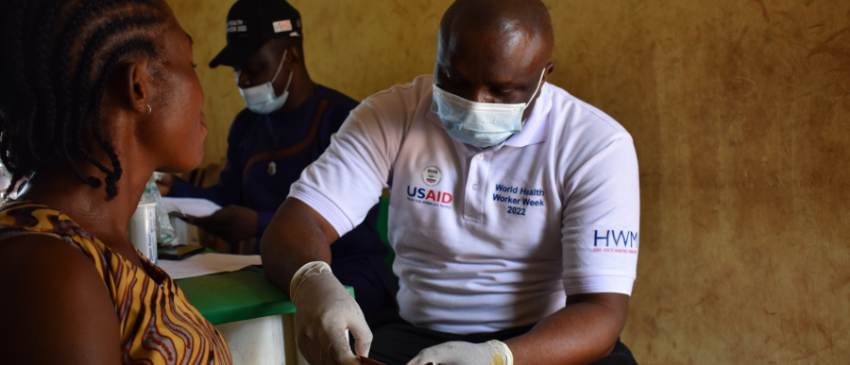
Closing the Gaps: Reaching Every Ward with Skilled Birth Attendants in Nigeria
Nigeria, the most populous country in sub-Saharan Africa, has approximately 40 million women of reproductive age. These women face disproportionately high risks giving birth. With 2.4 percent of the world’s population, Nigeria contributes 10 percent of global deaths for pregnant mothers and has the fourth highest maternal mortality rate (576 per 100,000 live births) and the second highest infant mortality rate compared to other countries.[1] These poor health outcomes are being fueled by a lack of skilled birth attendants in places where Nigerian women need them most, especially in rural areas. Many primary health care facilities in Nigeria face critical health worker shortages, including 59 percent of primary care facilities in the Federal Capital Territory (FCT), 81 percent in Kebbi state, 90 percent in Sokoto, 94 percent in Ebonyi, and 96 percent in Bauchi state.
The Government of Nigeria, supported by the United States Agency for International Development (USAID) and other donors, is working to address this health worker shortage. The National Emergency Maternal and Child Health Intervention Centre (NEMCHIC), under Nigeria’s National Primary Health Care Development Agency, was established as a national coordination center to provide oversight on reproductive, maternal, new-born, child, adolescent and elderly health and nutrition activities at the sub national level. As part of this effort, NEMCHIC designed the Reach Every Ward with Skilled Birth Attendants (REWSBA) strategy as a high-impact intervention to reduce maternal and under-five mortality in Nigeria by increasing the number of trained, skilled birth attendants at primary health care facilities.
Banyan Global is working in Nigeria to support this effort and address the human resources for health (HRH) crisis more broadly. We are leading the USAID Health Workforce Management (HWM) Activity. This five-year, $19 million project works in Kebbi, Bauchi, Sokoto, and Ebonyi states as well as the Federal Capital Territory to establish a cost‐effective, well-trained, and motivated health workforce, particularly in targeted rural and remote areas. HWM contributes to greater health systems responsiveness and improved health outcomes, especially among women and children. To accomplish this, HWM is strengthening the pre-service training learning environment and in-service training programs; supporting the development of a robust human resources information system to keep track of recruitment, deployment, retention, and continuing education; strengthening governance and management of the health workforce; and supporting HRH research to improve HRH practices and retention mechanisms.
A key activity under HWM is to support the National Primary Health Care Development Agency to develop and implement the REWSBA strategy. The REWSBA strategy defines a full complement of staff as one midwife and three community health extension workers (CHEWs) at each primary health care facility. According to that standard, large majorities of the USAID-supported primary health care facilities have health worker gaps. Last year, HWM held consultative meetings to help NEMCHIC finalize the REWSBA strategy guidelines and developed a toolkit to support the roll-out of REWSBA. In 2022, HWM is supporting the National Primary Health Care Development Agency to disseminate copies of the REWSBA guidelines and toolkit and hold dissemination meetings to provide the opportunity for states to adapt or adopt the strategy.
HWM is working with each of the target states and the FCT to recruit and deploy an additional 3,437 health workers to help close the gaps and improve maternal, child health outcomes in Nigeria. With HWM support by September 2021, the target states had deployed 524 new health workers.
[1] https://www.unicef.org/nigeria/situation-women-and-children-nigeria
